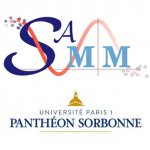Optimization and Data Science
Optimization and Data Science
27 mars 2019
The seminar will take place at the Sorbonne, Paris1 Panthéon-Sorbonne University,
Center Pantheon : 131-133, rue Saint-Jacques (or 12 place du Panthéon)
- Amphitheater 2A entrance by Hall Saint Jacques
- Decanal Appartment for the Lunch and the Closing Reception
The Sorbonne : 17, place de la Sorbonne
- Amphitheater Richelieu
![]() 8h30 - 9h00 Hall Saint Jacques (Center Pantheon)
8h30 - 9h00 Hall Saint Jacques (Center Pantheon)
Welcome Breakfast
![]() 9h00 - 10h00 Amphitheater 2A (Center Pantheon)
9h00 - 10h00 Amphitheater 2A (Center Pantheon)
Andrea Lodi, Département de mathématiques et de génie industriel, Polytechnique Montréal
On data, optimization and learning
In this talk, we advocate a tight integration of Machine Learning and Discrete Optimization (among others) to deal with the challenges of decision-making in Data Science.
For such an integration I try to answer three questions :
1) what can optimization do for machine learning ?
2) what can machine learning do for optimization ?
3) which new applications can be solved by the combination of machine learning and optimization ?
![]() 10h00 - 10h30 Hall Saint Jacques (Center Pantheon), Coffee break
10h00 - 10h30 Hall Saint Jacques (Center Pantheon), Coffee break
![]() 10h30 - 11h20 Amphitheater 2A (Center Pantheon)
10h30 - 11h20 Amphitheater 2A (Center Pantheon)
Dolores Romero Morales, Copenhagen Business School, Denmark
Learn and Interpret with MINLP
Data Science aims to develop models that extract knowledge from complex data and represent it to aid Data Driven Decision Making. Mathematical Optimization has played a crucial role across the three main pillars of Data Science, namely Supervised Learning, Unsupervised Learning and Information Visualization. In this presentation, we discuss recent Mixed-Integer NonLinear Programming models that enhance the interpretability of state-of-art supervised learning tools, while preserving their good learning performance.
![]() 11h20 - 12h10 Amphitheater 2A (Center Pantheon)
11h20 - 12h10 Amphitheater 2A (Center Pantheon)
Emilio Carrizosa, Universidad de Sevilla, Spain
Cost-sensitive classification and regression
A critical issue in classification and regression problems is how cost is taken into account. This involves both the measurement cost (and thus, we are interested in having sparse models, since less variables are used) and misclassification/regression errors, which may be of different magnitude and hard to callibrate.
In this talk we will discuss a few classification and regression models in which (Mixed Integer) Nonlinear Programming turns out to be a critical tool to address and control such cost-sensitive problems.
![]() 12h10 - 14h00 Decanal Apartment (Center Pantheon)
12h10 - 14h00 Decanal Apartment (Center Pantheon)
Lunch
The attendent are kindly invited to a lunck buffet at the Decanal appartement.
![]() 14h00 - 15h00 Amphitheatre RICHELIEU (The Sorbonne)
14h00 - 15h00 Amphitheatre RICHELIEU (The Sorbonne)
Andrea Lodi, Département de mathématiques et de génie industriel, Polytechnique Montréal
Dealing with uncertainty in tactical planning by machine learning
In this talk, we propose a methodology to predict descriptions of solutions to discrete stochastic optimization problems in very short computing time. We approximate the solutions based on supervised learning and the training dataset consists of a large number of deterministic problems that have been solved independently (and offline). Uncertainty regarding a subset of the inputs is addressed through sampling and aggregation methods. Our motivating application concerns booking decisions of intermodal containers on doublestack trains. Under perfect information, this is the so-called load planning problem and it can be formulated by means of integer linear programming. However, the formulation cannot be used for the application at hand because of the restricted computational budget and unknown container weights. The results show that standard deep learning algorithms allow to predict descriptions of solutions with high accuracy in very short time (milliseconds or less). A careful comparison with alternative stochastic programming approaches is provided.
![]() 15h00 - 15h50 Amphitheatre RICHELIEU (The Sorbonne)
15h00 - 15h50 Amphitheatre RICHELIEU (The Sorbonne)
Pablo SAN SEGUNDO, Universidad Politécnica de Madrid, Spain
Advances in combinatorial branch-and-bound techniques
for the Maximum Clique Problem
The Maximum Clique Problem is a fundamental NP-hard problem in graph theory which finds numerous real-life applications, such as pattern-recognition in data science. In the last decade a number of new upper bounds and implementation techniques have come to light, which have improved the performance of prior exact solvers by orders of magnitude. The relevance of these improvements has been such that there has been an upsurge of interest in solving other complex combinatorial problems and applications by reducing them to a maximum clique problem.
In this talk, some of the cutting edge improvements concerning exact maximum clique search will be discussed. Special attention will be devoted to the relation of these techniques with other combinatorial problems. At the end of the talk, the topic of pattern-recognition applications concerning cliques will also be addressed.
![]() 16h00 - 17h00 Decanal Apartment (Center Pantheon)
16h00 - 17h00 Decanal Apartment (Center Pantheon)
Closing Reception
The organizers
Ivana LJUBIC and Sonia VANIER
